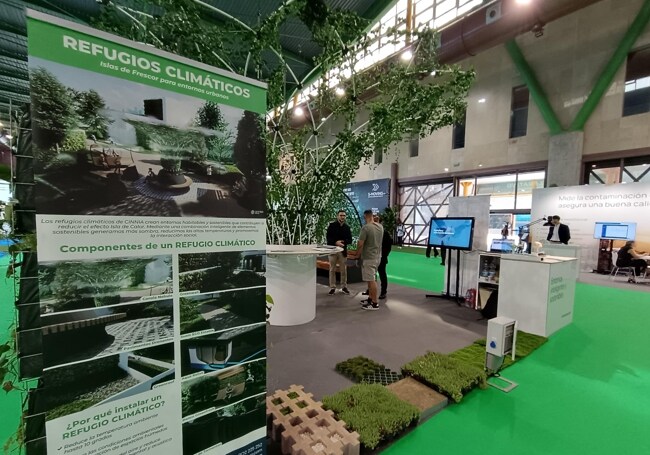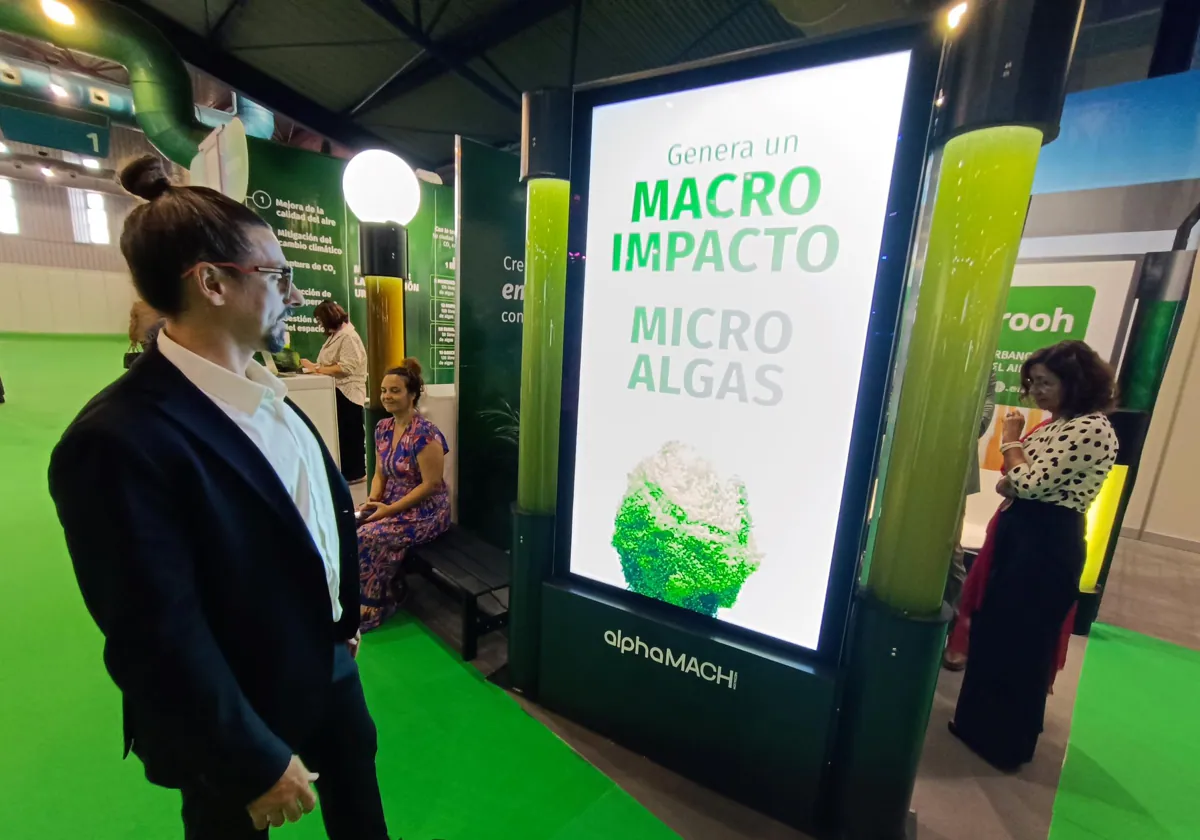Algae air-purifying lampposts and climate refuges: Is this the future for cities in Spain?
The Greencities & S-Moving forum in Malaga is showcasing the latest technological advances in urban transport and street furniture
Street lamps and billboards with algae that capture gases and purify the environment; climatic shelters that turn squares into green oases, and containers that identify the user, calculate the amount of rubbish they throw away...and for which municipalities will charge you in the future.
These are just some of the innovations being presented this week at the Greencities & S-Moving forum on urban intelligence and transport at the trade fair and conference centre in Malaga city. More than 75 municipalities (at least 30 mayors have confirmed their attendance), representatives from 19 countries and 140 expert speakers are participating in the two-day event.
Among the most innovative proposals is that of Respirooh, which has one objective: "To make people breathe better in cities", as Sergio López, general manager of Alpha Media Group, one of the companies that make up the Catalan consortium behind this project, explains. The large tubes with water and microalgae act as bioreactors, "and as they grow, they capture CO2 through photosynthesis and release oxygen, so we have cleaner cities".

In short, "living poles" that will soon be seen in cities, either as advertising supports or as lampposts, and without taking up extra space. They have already started to be introduced in cities such as Barcelona and Seville, "and from this fair we hope to set up many more, when the mayors get to know about it".
Rubbish by weight
Rototank, the brand name of the organic waste bins introduced by Malaga city council, is going to distribute 550 units throughout the city's streets. The mouth works without contact, although the main thing is that they will be equipped with electronic locks (by card or other device) to identify each household and its waste production, according to Daniel Fernández. In the medium term, city dwellers will have to pay a tax based on the waste they produce, as imposed by the EU.
"There are no smart cities without smart buildings".
People spend 85% of their time inside buildings, whether at work or at home. "Therefore, there will be no smart cities without smart buildings," said Luis Miguel Chapinal, dean of the Spanish association of telecommunications technical engineers, also present at the event.
He advocates that buildings and homes should be monitored by sensors. "To make them sustainable and improve their energy efficiency, we need to have data on energy consumption, which will help us to optimise". To this, he adds security sensors, in case of possible gas leaks or intrusions, "so that the information is transmitted to those who can resolve the problem".
For all these reasons, the association is promoting the introduction in the telecommunications infrastructure regulations of what has been called "the building node", which gathers all the information necessary for it to be sustainable and safe, "so that we can all live better".
Still in the world of waste, another company presenting its innovations at Greencities is Econward, which has its own technology that helps to revalue solid urban waste. According to the company, organic waste from cities generally arrives very dirty (because we recycle it badly at source) at treatment plants. What their technology does is to optimise these large volumes of materials: "It cleans them and what comes out can either be used to produce biomethane or compost". In this way, waste becomes a valuable resource.
From sunshine to oasis
Another of the great challenges facing cities is to create climatic refuges, spaces where inhabitants can take shelter from the heat, which is becoming more intense every year, especially in summer. This is what Cinnia, a Catalan company that focuses on urban innovation, is doing. "With the climate situation, we set out to do something to help change cities," said Laura Coll.
This is how they became manufacturers of this type of space: "Through one or more of our solutions, such as corolla, walls and green paving, we manage to lower the ambient temperature". The drop under their structures can be up to 10-12 degrees, compared to the outside.
Towards a new type of transport
In the field of transport, which is the focus of S-Moving, Mufmi.com, with offices in Granada and Malaga, has been launched. Its founder is Rainer Uphoff, a recognised transport expert, who won the National Mobility Award for his initiative in 2021. "We are dedicated to transport on demand, with a reformulation of public transport, especially in areas and times of low demand", in Malaga province municipalities such as Alhaurín de la Torre, Cártama and Pizarra.
Its main innovation is the use of technology for the integration of different means of transport. It is like an Uber for public transport: instead of lines and timetables, there are now stops, and when a user needs a service, an app determines their journey from A to B and the timings. The app then suggests the route and best travel times.
Not far from there is Alberto Jarit, one of the members of Cordoba-based company Interlight, which is dedicated to improving road safety in urban areas. The company has illuminated the main roundabout accessing Malaga Airport among many other projects in numerous towns and cities in Spain, France and Greece. The company also works in the collection of road and environmental data field.
Its proposals include intelligent pedestrian crossings and cycle lanes; special lighting for roundabouts and junctions, which are high accident spots. And they have also launched a system capable of recognising blind people when they approach traffic lights, so that they are detected and the crossing is made easier for them.

